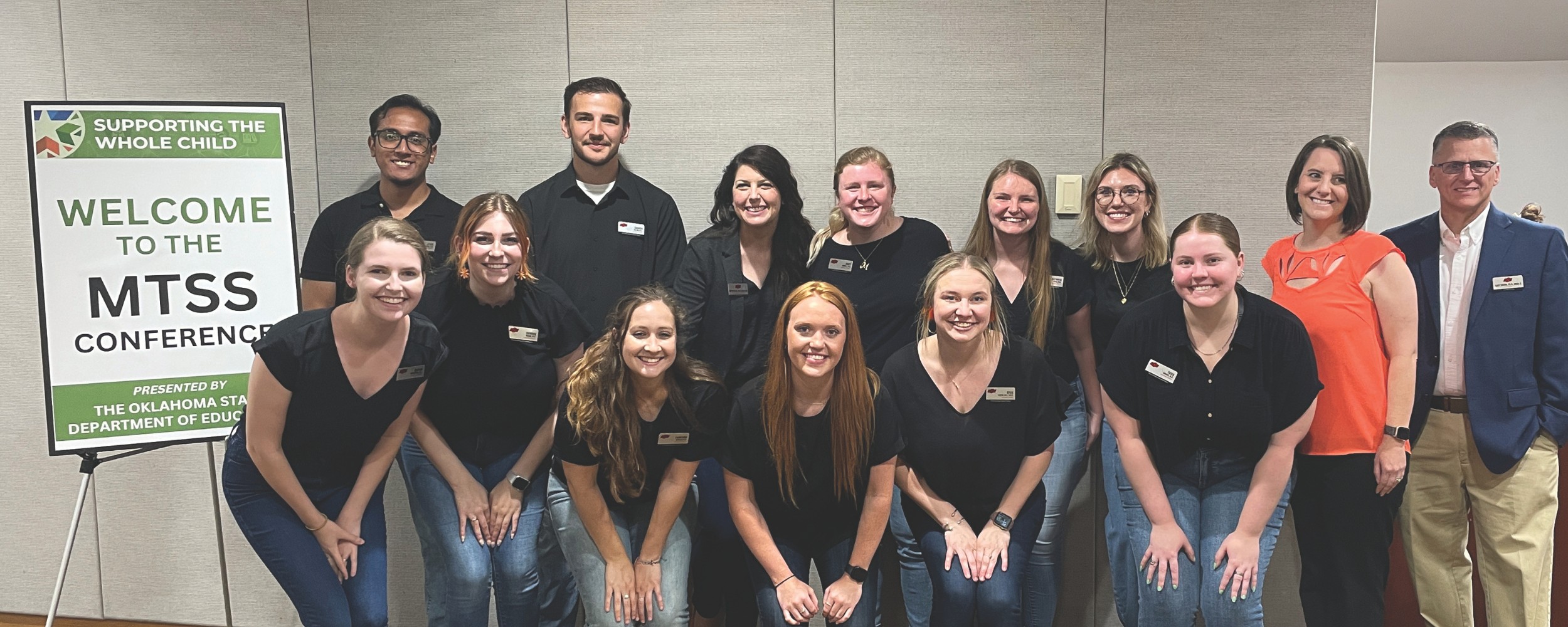
BRIDGEing a Gap: OSU center helps school districts support students statewide
Tuesday, October 15, 2024
Media Contact: Christy Lang | Director, Marketing and Communications | 405-744-9740 | christy.lang@okstate.edu
At Oklahoma State University, a unique center works to transform education statewide, one school district at a time.
The OSU BRIDGE Center (Building Resources and Interventions for Districts Seeking Growth in Education) aims to provide schools with evidence-based approaches to meet students' academic, behavioral and mental health needs. Through training, technical assistance and research, the center helps districts implement more effective practices to support student success.
Launched two years ago, the center emerged from existing collaborations between Drs. Gary Duhon, Sara Rich and Bri’tny Stein. The three school psychologists each participated in extensive consulting work with schools statewide.
“Instead of duplicating efforts, it made sense to combine the work Dr. Stein and I were doing through the OSU Center for Health Sciences and Dr. Duhon’s work with the school psychology program in Stillwater,” Rich said. “This formed one resource for education agencies wanting to build a prevention framework for academic, behavioral and mental health needs.”
Duhon and Rich are co-directors with Stein, who is the director of training and technical assistance.
The BRIDGE Center supports districts across Oklahoma, serving schools in major cities and rural areas. Its team members have collaborated with an estimated 15-20% of the state's more than 500 school districts. The center assists K-12 schools broadly but tends to work more with elementary schools due to the focus on prevention and early intervention in Oklahoma school districts.
"Our ultimate goal is to serve as a resource for school districts," said Dr. Gary Duhon, co-director of the BRIDGE Center.
The BRIDGE Center works to improve the outcomes for Oklahoma students by offering professional development, consultation and coaching for schools focused on Multi-Tiered Systems of Support, a framework for efficiently and effectively supporting students needing academic, behavioral, and social-emotional support.
Beyond individual districts, the BRIDGE Center partners closely with state agencies on several statewide initiatives. Most recently, the center worked with the Oklahoma State Department of Education to assist in conducting a statewide conference focused on MTSS.
"The conference was a big success,” Duhon said. “I think there were more than 500 educators in attendance at the conference.”
The center's work spans multiple areas, but a significant focus is on school-based mental health. With increased funding available through federal grants, many districts are working to better identify and support students with mental health needs.
"We're training schools on the use of screeners designed to identify the mental health needs of students and then to respond to those needs at both the system level and the individual level to maximize impact and increase success in a fair, equitable and efficient manner," Duhon said.
A vital aspect of the BRIDGE Center's approach is not just providing one-off training but following up with coaching and support to ensure practices remain even after training is complete.
This ongoing coaching is critical for lasting change.
"Delivering one-and-done training may have a temporary effect, but we have seen over and over again that lasting change takes more than just one training," Duhon said.
Although it's still early to measure long-term impacts like academic improvements, which can take 3-5 years to manifest at the system level, Duhon said they are already seeing positive changes in areas like student behavior referrals.
The center assists schools and provides unique learning opportunities for OSU graduate students in school psychology. Unlike many programs that focus solely on individual assessment and intervention, OSU students can participate in systemwide change efforts.
“(Our) students get to engage in some advanced activities and work with state-level agencies,” Duhon said. “Most school psychology programs don't have opportunities for their students to do systemwide or state-level work.”
The program’s ultimate goal for the school psychology graduate students at the end of their training is confidence in not only clinical practice, but also in advocating for change at the policy level.
"My hope for our students is that they leave here not only with the capacity to be good solid school psychologists but to be good system-change agents," Duhon said.
As a collaboration between the OSU-Stillwater and OSU Center for Health Sciences campuses, the BRIDGE Center embodies the cross-system partnership that OSU President Kayse Shrum prioritized. With its mix of research, training and real-world impact, the center is building bridges to a better future for Oklahoma's students.
Photos By: Provided
Story By: Jillian Walker | ASPIRE Magazine
